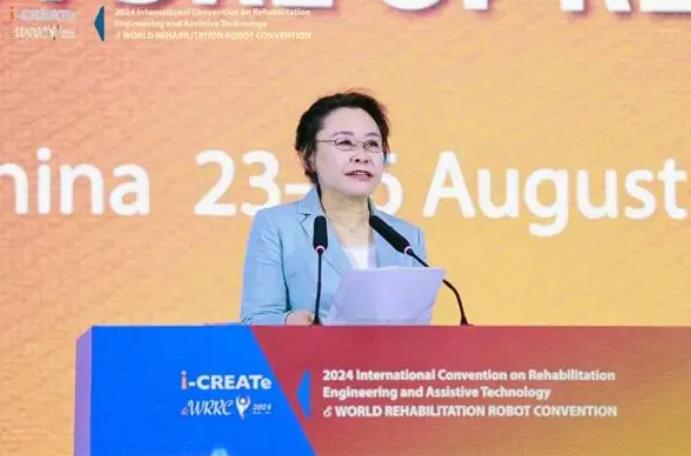By Wang Yanfang
Intro: Zhang Haidi, president of Rehabilitation International, highlighted the transformative power of technology for people with disabilities at the International Convention on Rehabilitation Engineering and Assistive Technology in Shanghai last month.

The International Convention on Rehabilitation Engineering and Assistive Technology & World Rehabilitation Robot Convention took place from Aug. 23-26.
The convention, themed “Intelligent Technology Empowers the Future of Rehabilitation,” addressed key aspects of rehabilitation engineering and assistive technology. Topics included rehabilitation therapy, nursing, and accessible design.
In her address, Zhang highlighted how science and technology are transforming the lives of people with disabilities. She cited cochlear implants that help deaf people experience sound and exoskeleton technology that enables those with spinal cord injuries to stand and walk. Zhang also noted that advances in rehabilitation science and technology contribute to progress in brain science and artificial intelligence.
Zhang described rehabilitation as a frontier of 21st-century science and technology, highlighting its promise and bright prospects. She noted the field’s continuous stream of inventions and creations, bringing professional talents together to apply advanced concepts and technology. These efforts aim to eliminate pain and improve quality of life for those needing rehabilitation services, Zhang said, allowing technology to compensate for injuries. She added that everything is possible when we look forward to the future.
She urged global collaboration among scholars and experts to cultivate talent and drive innovation in rehabilitation technologies. Zhang also stressed the growing importance of rehabilitation in aging societies, noting its impact on quality of life and dignity.
The RI president called for increased innovation in rehabilitation, emphasizing its potential to advance the field both in China and globally.
Zhang emphasized the importance of humanitarianism in rehabilitation science and technology, stating it enhances people’s sense of well-being.
The convention, which drew over 1,000 experts, scholars, and representatives from international organizations, was jointly organized by the Coalition on Rehabilitation Engineering and Assistive Technology of Asia, the China Association of Assistive Products, and the University of Shanghai for Science and Technology.
During the convention, Zhang visited key rehabilitation facilities in Shanghai, including the Shanghai Yangzhi Rehabilitation Hospital and the Shanghai Engineering Research Center of Assistive Devices. She also attended the unveiling ceremony for the Institute of Intelligent Engineering at the University of Shanghai for Science and Technology.

